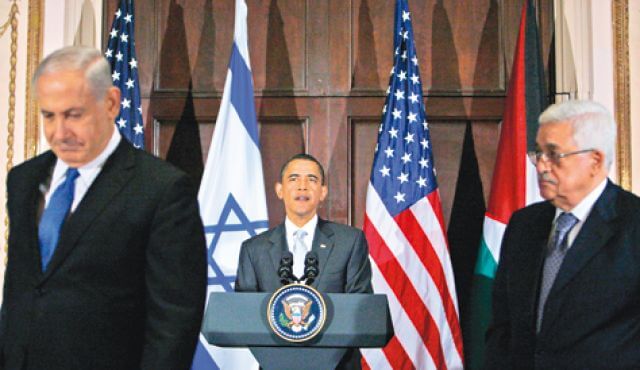
As Secretary of State John Kerry’s April 29 deadline looms for Israeli-Palestinian negotiations, the State Department has dropped any pretense that talks will result in a framework agreement, instead confirming that negotiations at this point revolve around keeping the moribund “peace process” on life support for a few more months. Whether or not the United States succeeds in arm-twisting the Palestinians to extend these sham negotiations for another fruitless round, it is clear that the jig is up.
Even U.S. political elites, such as Kerry himself, who last spring became the first U.S. politician to put a timeframe of one to two years on the remaining chance for a two-state resolution to the Israeli-Palestinian issue, recognize the last-ditch nature of the current “peace process” and the impending demise of the two-state paradigm. Due to Israel’s continued torrid colonization of Palestinian land and its unwillingness to countenance true Palestinian sovereignty over any amount of historic Palestine, the days of trying to hammer the square peg into the round role are drawing to a close.

“When a system loses its legitimacy,” as did the apartheid regime of South Africa, argues Abunimah, “all the weapons in the world cannot protect it [and] we’re beginning to see a similar loss of legitimacy for Zionism.” Indeed, in his book, Abunimah provides copious evidence of how Israel and its supporters are no longer able to defend their cause on its merits. With the discourse ceded and the reality of Israel’s apartheid regime and oppression of the Palestinians laid bare, Israel and its lobby are reduced to the untenable position of losing institutional support if democratic processes are allowed to unfold unhindered, or suppressing debate and subverting democratic processes itself to maintain the illusion of continued support for Israel.
Nowhere is this Zionist conundrum playing itself out more dramatically than on college campuses today, as Students for Justice in Palestine and similar organizations have succeeded in defining Palestine as one of, if not the most, burning issues on campus this decade through sophisticated, coalition-building campaigns of boycott, divestment and sanctions (BDS). Abunimah documents in his book the fearsome intimidation, the McCarthyite blackballing, and even the attempted criminalization of freedom of expression that the Israel lobby is pushing in a frantic, rearguard action to stanch the debate. Because, as Abuminah argues, “no matter how much Zionist groups belittle this or that student-council divestment resolution as merely a nonbinding or insignificant recommendation, the intensity of Zionist and Israeli efforts belies an understanding that the BDS movement and the struggle for Palestinian rights more broadly have the potential to score much bigger victories in the years to come.”
As important as Abunimah’s documentation is of the advancing BDS movement, perhaps the greatest contribution his book makes is to upend truisms, uncritically examined for too long, upon which Israel and its supporters have relied. He does so masterfully, especially in a chapter entitled “Does Israel Have a Right to Exist as a Jewish State?” (excerpted here) Abunimah concludes that Israel does not have such a “right” because to assert so contradicts basic notions of democracy and equality. “Whereas in most countries—and certainly in any that claim to be democratic—rights accrue to citizens without discrimination, Israel makes a fundamental distinction between citizenship and nationality,” Abunimah notes. Moreover, he argues, “Israel was created as a ‘Jewish state’ by expelling Palestinians and preventing their return. It can only survive in this form by maintaining current and committing future violations of the rights of Palestinians. To deny the rights of Palestinians wherever they are so that Israel can maintain a Jewish majority created through violence and discrimination flouts every contemporary principle of human rights and international law.”
But if Israel refuses to allow for meaningful Palestinian sovereignty and if Israeli Jewish society today nearly uniformly opposes living as equals with Palestinians in the same state structure, then how can the Israeli-Palestinian issue be resolved? Here Abunimah remains optimistic, marshalling evidence from successful, if imperfect, transitions to democracy and equality in South Africa and Northern Ireland that once seemed unthinkable. Abunimah refuses “to allow our vision of justice to be constrained only by what seems realistic from the perspective of today, and especially not by what powerful and privileged groups deem acceptable or pragmatic.” He reminds the reader that up until the very end of apartheid in South Africa, white South Africans also opposed democracy and equality, “predicting that any attempt to impose it would lead to a bloodbath.”
With the demise of the “peace process,” the snowballing of the BDS movement, and Israel’s increasing pariah-hood, this day of reckoning may be sooner off than many expect, as even Barack Obama has warned. In an interview last month with Bloomberg, the president cautioned that “if you see no peace deal, and continued aggressive settlement construction—and we have seen more aggressive settlement construction over the last couple years than we’ve seen in a very long time—if Palestinians come to believe that the possibility of a contiguous, sovereign Palestinian state is no longer within reach, then our ability to manage the international fallout is going to be limited.”
Instead of continuing to rely on the stale, discredited advice of pro-Israel ideological zealots such as Martin Indyk and David Makovsky, who currently head the U.S. “peace process” team, the Obama administration—as well as all concerned people—would do well to turn to Ali Abunimah’s The Battle for Justice in Palestine to think freshly about how to resolve the Israeli-Palestinian issue fairly and justly in this coming post-“peace process” era.


I’m enjoying Ali’s book right now. Will have more time to thoroughly read it once I’ve finished teaching this semester.
I’ll be hosting him at Firedoglake’s Book Salon on Sunday, May 18th, from 5 pm to 7 pm EDT. At the time, you can ask him anything you like regarding the book and its reception.
http://fdlbooksalon.com/2014/05/18/fdl-book-salon-the-battle-for-justice-in-palestine/
For those curious, MJ Rosenberg gives his review at the Amazon website.
link
In case the link goes bad, at the moment it’s the only 4 star review. (The others are five as I write.) Ali Abunimah responds by objecting to Rosenberg linking him to terrorists and Rosenberg edited his review to take that out.
This is probably a good example of how many self-described liberal Zionists will react.
— interesting
Israel (the government and, I’d i agine but do not know, also the Jewish people) want to keep all or much of the West Bank (and Golan) and want to relinquish nothing of pre-1967 Israel. Their original (pre-1948) plan (or hopes) were to expand to at least the whole Land. thoughts of taking Lebanon to the Litani River were also expressed by some. It was reasonable, How can a country exist without water?
This is a question much of the world will soon be asking, more and more, but I digress.
Israel (the government and, I’d i agine but do not know, also the Jewish people) want to keep CONTROL OF all or much of the West Bank (and Golan) and want to populate these places with their own people. That’s what settler colonialism is, and that’s what Zionism is.
So there is no room at the moment on the ground (and in their dreams at all) for a Palestinian mini-state. No room. Zionism-in-practice has so arranged it. It is the meaning of the so-called facts-on-the-ground.
Four possibilities remain: [1] continued apartheid, which is Israel’s plan and Israel’s dream; [2] forced removal of Israel (people, buildings, wall) from a large territory thereby making room for a Palestinian state (my plan, my dream, with EU and UN as the dreamed-of sanctioneers, the “deus ex machina” for my justice-play; [3] a one-state upon all the land which begins (as it now is) in apartheid and ends (via what pressures? the same sanctioneers?) as a democracy, as South Africa did; and [4] the final removal of the Palestinians. the completion of the exile begun by the ethnic cleansing of 1948.
If the nations do not act, Israel will continue apartheid [1] or continue with exile [4]. If the nations finally do act, exert pressure on Israel, what results might be [2] or [3], and what results might depend on what the nations demand as their price to end their sanctions.
Sanctions are funny things, not predictable. In a case like this, where it has taken 47 years before sanctions are even discussed, the anger and disgust needed to generate the sanctions might not relax easily after the sanctions are first put in place. (Look at the sanctions on Iran, now, not lifted though the goals seem met.) I suggest that Israel would do better to “give in” (whether to [2] or [3]) well before the nations get their act together.
I look forward to reading Ali Abunimah’s book. I hope it goes well beyond the last 20-years of ‘peace process” foolishness to recite the facts of life within Israel 1948-1967 and the facts of the occupation (1967-present). Every book on I/P should recite the horrors so that people who are just coming “on board” can learn the history that NYT and so many others seek always to hide.
slightly connected.
White house flip flopping again.
Kerry / Obama disobeying their masters.What next??. A refusal to veto on behalf of Israel.
“White House: Hamas-Fatah reconciliation ‘isn’t necessarily a bad thing’ ”
http://www.haaretz.com/news/diplomacy-defense/.premium-1.587869#